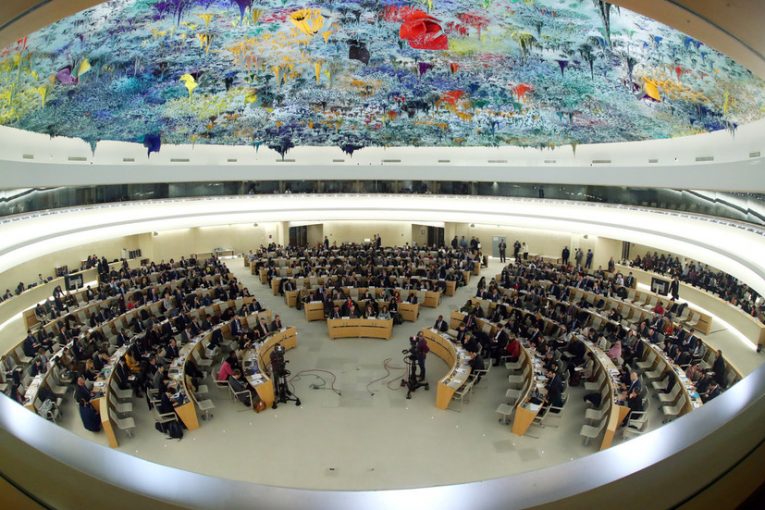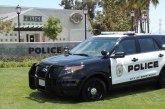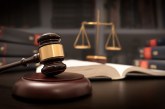

By Nikki Suzani
NEW YORK – The American Civil Liberties Union (ACLU) has released a statement demanding, along with a coalition of 600 other human rights groups, that the United Nations Human Rights Council (UNHRC) hold a special meeting to address US police brutality.
The goal, a global response to the issue, comes in hope of finding the U.S. in violation of international laws surrounding repression of protests and treatment of citizens.
The ACLU urged the UNHRC to begin an independent inquiry into not only police brutality but also the treatment of journalists and protesters in demonstrations, and the indiscriminate use of tear gas (a weapon banned in international warfare), rubber bullets and pepper spray on civilians.
The goal is that the inquiry will result in recommendations to the U.S. of how to change its behavior.
The ACLU also demanded that the “right to peaceful assembly and demonstration… be protected,” noting that repression of protests and police brutality violate the following international treaties: the International Covenant on Civil and Political Rights (ICCPR), the Convention against Torture and Other Cruel, Inhumane or Degrading Treatment or Punishment (CAT), and the International Convention on the  Elimination Of All Forms of Racial Discrimination (ICERD).
Elimination Of All Forms of Racial Discrimination (ICERD).
In order for a special UN session to be held, one-third of member states must agree to it.
In a letter to the UN Human Rights Council on behalf of victims of unarmed Black people killed by police, the groups wrote, “We are deeply concerned about the escalation in violent police responses to largely peaceful protests in the United States, which included the use of rubber bullets, tear gas, pepper spray and in some cases live ammunition, in violation of international standards on the use of force and management of assemblies including recent U.N. Guidance on Less Lethal Weapons.”
The letter adds, “Our greatest concern is that the violence and counter-violence are diverting the gaze of the global community away from the pain being expressed by a nation in mourning over the callous manner of the 8 minutes and 46 seconds that ended George Floyd’s life while a group of police stood and watched, about the death of more than 100,000 souls from the coronavirus – disproportionately killing Black, Brown and Indigenous Peoples – and about how injustice never ends and equality never comes.
“There is serious concern that the tear gas and police-induced havoc will obscure the legitimate passion of these demonstrations. The voices of the demonstrators must be heard. Their demand is that the endemic racism, hatred, fear and disparity finally be confronted.”
They add, “The right to peaceful assembly and demonstration must be protected. This mandate is even more compelling with regard to the rights of minority communities, especially people of African descent, to speak out against racist practices they have endured for centuries.”
The groups are therefore calling on members of the U.N. Human Rights Council to convene a special session of the HRC in order to respond appropriately to this situation of escalating human right abuses with the aim of mandating an independent inquiry.
To sign up for our new newsletter – Everyday Injustice – https://tinyurl.com/yyultcf9






Shame!
Several levels…
World to U.S.: “Shame!”
That should help.
The shot clock giveth, the shot clock taketh away.
Actually, the shot clock only taketh away.
I’m pretty sure that’s already protected.
But we all know that in many instances the protesters weren’t peaceful, don’t we?
Funny how that never came up in this article.
Is the U.N. looking into the many far more brutal law enforcements and human rights violations all over the world or just the U.S?
There is an interesting history here. In 2014, a group decided to compile a similar report about police violence against youth of color in Chicago and to send a delegation to Switzerland to present the report to the UN Committee Against Torture using the name We Charge Genocide. That name came out of similar movements from across the world which drew attention to genocide in Africa.
As of 1 January 2020, 117 UN member States will have served as Human Rights Council Members, including: Afghanistan, Albania, Algeria, Angola, Azerbaijan, Bahrain, Bangladesh, Bolivia, Botswana, Brazil, China, Cuba, Democratic Republic of the Congo, Ecuador, Egypt, El Salvador, Ethiopia, Ghana, Guatemala, India, Indonesia, Iraq, Jordan, Kazakhstan, Kenya, Kuwait, Kyrgyzstan, Latvia, Libya, Mexico, Mongolia, Morocco, Namibia, Nepal, Nicaragua, Nigeria, Pakistan, Panama, Paraguay, Peru, Qatar, Republic of Korea, Russian Federation, Rwanda, Saudi Arabia, Senegal, Sierra Leone, Somalia, Sudan, Tunisia, Uganda, Ukraine, United Arab Emirates, Uruguay, Venezuela (Bolivarian Republic of), Viet Nam, Zambia.
These countries will participate in the UN HRC condemning US human rights.
Got it.
And just think, we imprison citizens at a higher rate than any of them.
Here’s the death penalty…
One of the problems of comparing a free and just society like the US to these other regimes is that they control the numbers reporting and the US has people like you accessing all the information from the Freedom of Information Act and not being poisoned or shot for threatening the regime.
That is something to consider no? The price of freedom is the freedom to act out knowing that the landing would be pretty soft compared to places like Singapore where there is a lot less crime and a lot fewer people in prison per capita.
The other interesting thing here is how the black participation in these statistics for crime and punishment contribute to the overall meme of a broken law enforcement and justice system.
Durkheim is a good read for more deep thinking on this. And it somewhat connects with my theories and worldview related to the black urban situation. I am sure you will disagree because these concepts are not political advantageous to the “cops are racists and the reason for the misery in the black community” agenda of the American left. But all three of these conditions are prevalent and have been increasing at the very time that the black community was poised to enter mainstream society. It was like we backed the ramp up and then started pulling it away just as the people started to go there.
https://www.d.umn.edu/cla/faculty/jhamlin/4111/Durkheim%20-%20Division%20of%20Labor_files/The%20Normality%20of%20Crime.pdf
The US has always been a unique place. The 3rd largest population behind China and India but without much cultural history binding its people. That replacement glue was the American idea combined with a fantastic and diverse path to mainstream prosperity. And both have been destructed and continuing to unravel. It started in the 1970s. I will always blame the Baby Boomers… the first Me-Myself-and-I generation that followed the last Great Generation.
Wow, I wasn’t expecting to delve into early 20th century sociology. Nevertheless, my point was that the US hardly has a stellar record on human rights front and it remains problematic.
But I do find your argument paradoxical at best – freedom is the reason that the US incarceration policies resemble those of tyrannies. Freedom. Not racism and inequality. Freedom. That’s fascinating.
Our system is so awful that people all over the world are begging to come here.
Which is interesting because our system really was awful for a lot of people – can you deny the horros of slavery? Jim Crow? Indian Genocide? Japanese internment camps? And countless other American attrocities? But somehow still less awful than other countries.
JB, I think you just got “OK Boomer”-‘d.
The Great Generation (weird name) also had separate drinking fountains based on skin color. “Great”. I wonder what would have happened if an Asian showed up in the South back then — did they just dehydrate?
It’s a weird history. For example, the Separate Car Act, which became the basis for Plessy, Chinese were allowed to legally ride in the whites-only coach.
This is a pretty interesting article on how Asians went in from having the Chinese exclusion act in 1882, mandated Chinese registry in the 1890s, war against Japan, internment camps, and then by the late 1940s, passing up African Americans and closing the gap on whites.
Link
I didn’t know that . . . it is weird . . . so much of this stuff is . . . when beings are confronted by the mysterious ‘other’.
Wow. I didn’t expect 19th and 20th Century references to modern times.
Might want to check this out: https://mental-health-matters.com/past-vs-present-in-borderline-personality-disorder/
Some people, traumatized by past events that they experienced or virtually re-lived through stories as a sensitive surrogate victim, continue to conflate that past with the present. It is not a good thing.
I suggest a health dose of “statute of limitations” rules development. Otherwise the Ottoman invasion and slavery of the people of my Iberian Peninsula relatives, and later, the British oppression of my Irish and Scottish ancestors, will allow me to also join a modern victim club.
Well at least David managed not to bring up ‘mowing while black’.
Yet . . .
I wonder if the U.N. is going to look at the new country of CHAZ located in Seattle for the recent choking of a preacher by BLM and ANTIFA activists?
https://www.bizpacreview.com/wp-content/uploads/2020/06/Seattle-CHAZ-choke-preacher.jpg
BTW, check out the new autonomous area of CHAZ with no police. It’s a flourishing community with broken windows, garbage and graffiti everywhere. It’s Nirvana if you want to live in fear.
Depends on whose account you read. Fox News it’s a disaster area. Other accounts have it doing pretty well. Fox News has been accused of doctering the photos from there.
So do you support CHAZ?
Under normal conditions, I would consider flying up there and doing a story on it and seeing it for myself.
You didn’t answer my question.
I did – I need more information. Accurate information.
You already have a lot of information. For instance you know that a group of activists decided to overtake six blocks of a city and make it their own nation. How about the people who were already living there, the businesses that operate there, etc…
Are you okay with that? If a group of activists decided to take over a swath of downtown Davis you wouldn’t have an opinion on that? That would be something you need more information on?
I have seen very conflicting accounts and also evidence of photographic manipulation, so I’ve answered your question, the answer is not oging to change. If a group of activists took over downtown Davis, I could walk there and see for myself.
Just the fact that you wouldn’t be aghast in the first place that a group of activists took over a portion of downtown Davis and that you would have to see for yourself pretty much says it all.
Look I know the right wing is having a conniption over this – but frankly it’s pretty low on my radar at the moment.
I feel the left wing should be bothered by this too. Davis is a very left leaning town, do you feel Davis citizens would be okay with a fringe group of activists taking over a portion of the Davis downtown with barricades and armed guards?
Why is this so troubling to you?
Why isn’t this troubling to you should be more the question?
Because I worry about things like systemic injustice, not what some group of people choose to do in one location. Just like with things like People’s Park, Occupy or the Occupation of Katehi’s office, it’s going to end at some point. The systemic issues aren’t. The bigger problem is when government uses force to remove people rather than waiting for them to get bored.
So you would feel the same if a group of armed right wingers took over a section of the city?
I would not feel the same
I recommend this as a worthwhile nearly 2 hours of your precious time on this dimension of existence. He even goes after Trump, so most of you will at least like that part.
https://samharris.org/podcasts/207-can-pull-back-brink/
Yes, there was a lot of crime in the 1800’s Wild West and it was the most free. Even the land was free through the Homestead Act.
But it wasn’t really that free because of the lack of security. High mortality rate. Low life expectancy.
There is always a need for balance between freedom and security… freedom without rules is anarchy and anarchy ends up being less free because there is less security. But too much focus on security and freedoms erode. Just consider your loss of freedom to use airline services since 9-11… all in the name of keeping you secure.
You cannot have freedom without security, and you cannot have freedom with too many rules and the enforcement that goes along with it. But to have a free society without so many rules and enforcement you need some binding morality of cultural norms. You cannot expect divergent subcultures all competing for power to end up making a better society.
Next time you are in the elevator turn toward the back of the elevator and note the discomfort of all those other passengers. You just broke the code. The other people will not feel secure. They will not trust you. Standard human psychology.
Our common binding morality has been eroded by politicians, academics, progressivsm, technology and media primarily. The observations of Tocqueville are long gone. We are going back to the Wild West… a place with more freedom and less security.
And ultimately this will result in less freedom.
I know so many people now buying guns for the first time.